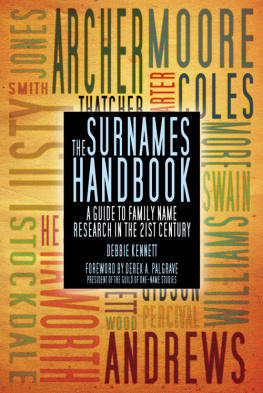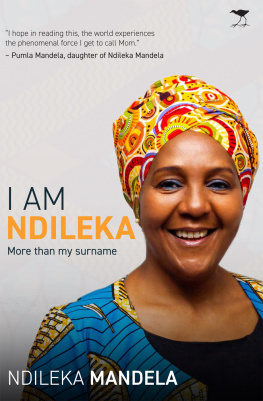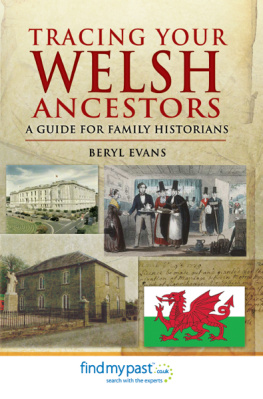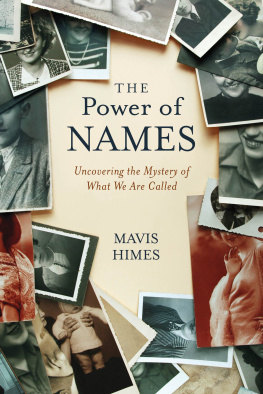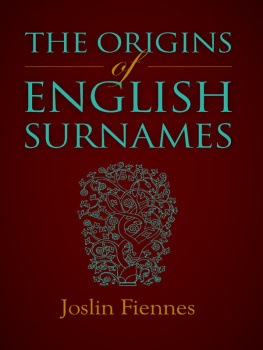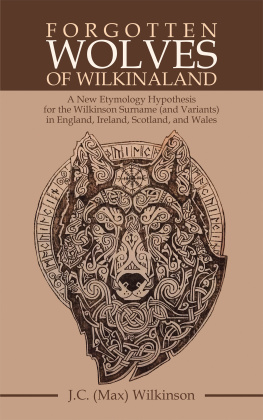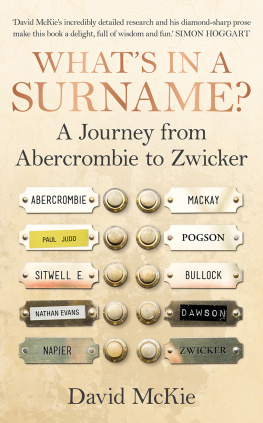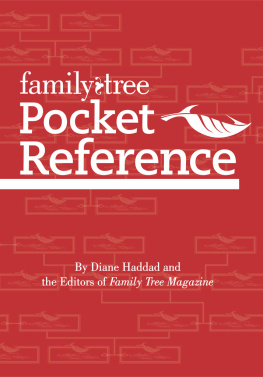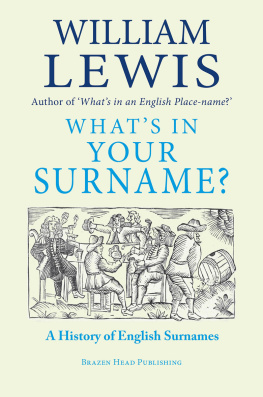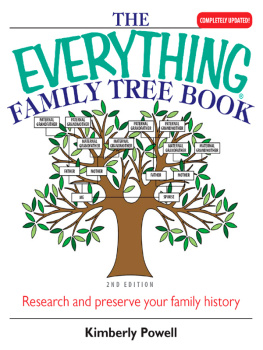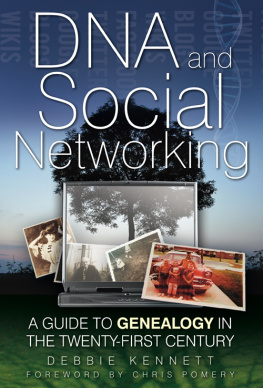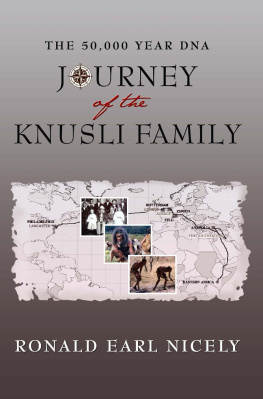
To Guy, Tim and Alex
T his book builds upon the pioneering research of all my predecessors who have written about surnames over the last 400 years and who have each in their different ways contributed to our understanding and knowledge. I have quoted freely from many of these authors as their wise words still resonate today. I am particularly grateful to the late Philip Dance. I never had the pleasure of knowing or corresponding with him, but he effectively laid the foundations for twenty-first-century surname research with his Modern British Surnames website, where he gathered together all the many resources on surnames from many different disciplines. Philips work is now preserved on the new Surname Studies website ( www.surnamestudies.org.uk ), which is sponsored by the Guild of One-Name Studies and serves as a lasting tribute to his memory. I am indebted to Mike Spathaky who took on the responsibility of transferring Philips work to its new home, and who now maintains the new website. Without this resource the task of writing this book would have been much more difficult and many obscure sources would have remained undiscovered.
I would like to thank Derek Palgrave for kindly writing the foreword to this book, and for allowing me to reproduce his selective substitution table. Derek also provided particularly helpful comments on my chapters on one-name studies and variants and deviants, and pointed me in the direction of some useful references. James Irvine kindly read the first draft of my manuscript, and provided many helpful and thoughtful comments, as well as providing guidance on sources for Scottish research. Andrew Millard also kindly read the entire manuscript and provided me with some very useful comments and valuable suggestions. Chris Pomery gave me constructive criticism on a number of key chapters.
I am grateful to John and Sheila Rowlands for permission to reproduce a table from The Surnames of Wales . Sheila Rowlands also kindly checked and corrected my Welsh sections, and helped with the compilation of the list of Welsh lay subsidy rolls in Appendix C. Oliver Padel kindly shared some of his research with me, pointed me in the direction of some very useful references, and also helped with the compilation of the list of lay subsidy rolls. John Plant and Ralph Taylor both commented on my DNA chapter.
Stephen Archers British 19th Century Surname Atlas CD has been an invaluable resource while writing this book, and I am also grateful to Stephen for permission to use maps generated from his CD as illustrations. I would also like to thank Fiona McElduff, Pablo Mateos, Angie Wade and Mario Cortina Borja for permission to reproduce their tables of the top twenty surnames in England, Scotland, Wales and Northern Ireland.
Family historians are always generous with their time and advice. Karen Williams went out of her way to help me when I made my first tentative steps into family history research. Chris Gibbins has helped me enormously with my Devon research, and has tracked down many obscure references for me. Elizabeth Glover Howard has been a helpful and friendly correspondent on all matters relating to Devon and heraldry, and has also kindly assisted with various aspects of my research. The late John Overholt provided guidance on the most useful medieval sources for family history research.
I would like to thank all the members of the Guild of One-Name Studies who have generously shared their knowledge in the Journal of One-Name Studies , in the Guilds wiki and on the Guilds mailing list. I am very grateful to all the people who have shared their research with me for my Cruse/Cruwys/Cruise one-name study, as well as all my relatives who have helped me to research all the other branches of my family tree. I would also like to thank all the people who have participated in my DNA projects.
I am grateful to Katharine Reeve for suggesting that I write this book, and to The History Press for once again putting their faith in me.
Finally, I would like to thank my family who have endured my preoccupation with surnames for the last year and who have had to put up with the prevailing domestic chaos, especially in the last few months as the deadline loomed ever closer.
CONTENTS
APPENDICES
A
B
C
D
E
F
G
I t is a privilege to have been invited to write this foreword and it gives me great pleasure to be able to introduce readers to this new work. The author has a formal background in European languages which, I suspect, may well have provided her with some unique insights into the meaning and structure of surnames. Furthermore she also spent several years working for a publisher, accumulating the necessary experience required in the production of specialist periodicals. As an editorial manager she was involved in writing, editing, and supervising layout all in the days prior to the general adoption of word-processing techniques.
From quite an early age she has been fascinated by her own family surname, Cruwys , which very few people seemed able to spell or pronounce. I have sympathy with her, as in spite of my surname being easy to spell its pronunciation is remarkably variable. It is, of course, not enough just to be interested in a surname action is required. This is not usually convenient during the first few decades of ones life when formal education, marriage and children normally take precedence. Nevertheless there comes a time, often a specific event, when the familys history comes into focus.
In Debbies case it was the death of her father-in-law which brought about a resurgence of interest. Sudden access to a large collection of family photographs prompted her to write around to relatives in order to identify the images of the individuals represented. One of those she contacted had already done some research into her mother-in-laws family, Woolfenden , so it seemed appropriate to extend this project. This soon provided the further incentive for her to investigate her own family of Cruwys . This eventually developed into a one-name study with the objective of painting a comprehensive picture of the evolution of this surname and its subsequent ramification. Registering that surname with the Guild of One-Name Studies was a natural outcome.
She found the generation of her one-name study a fascinating process embracing a great deal more than the mere drafting of family trees. She realised just how important it was to establish how and where the surname had emerged and that some appreciation of early linguistics needed to be invoked. The paucity of early records and their lack of consistent spelling alerted her to the widespread occurrence of variant spellings as there were no means of standardisation when the largely illiterate bearers migrated from place to place.
Her experience of research in this field, coupled with her earlier years in publishing, made her an ideal candidate to take on a systematic review of the wide range of evidence, which is available to anyone embarking on an enterprise of this nature. This book is a careful distillation of her findings. It is also a valuable guide to the published literature in this field, not only that in book form, but also a great deal of the reference material now available on the internet. Most of the classic texts by known writers in this field are mentioned in context: Guppys pioneering work on surname distribution receives due credit, as do the more recent surname texts by Reaney, Redmonds, Hanks and Hodges, Hey and Rogers.
She devotes a sizeable portion of her review to pre-1600 resources pointing out that quite a significant number are now accessible as published transcripts. Family historians rarely make use of such data as they omit evidence of genealogical linkages. However for details of distribution and early spelling these are particularly useful. Published versions of subsidy rolls, pipe rolls, hundred rolls, poll taxes, inquisitions post mortem, etc. are often accessible in major libraries and occasionally online. Older texts that are out of copyright can often be accessed in the Internet Archive.
Next page
